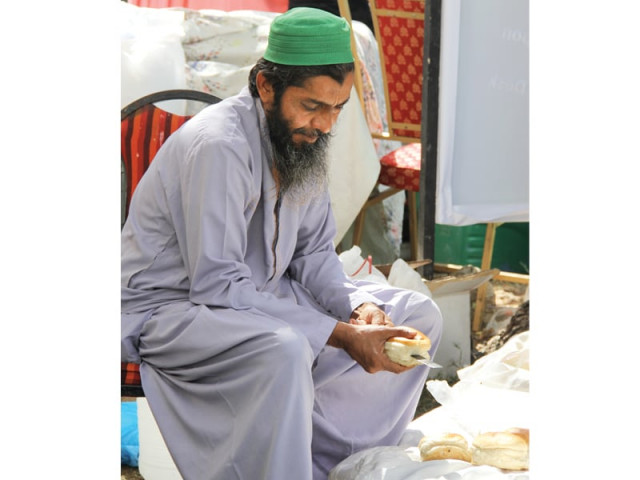Remember the forgotten province?
Balochistan — a national treasure buried too deep in ignorance to be celebrated.

One place that attracted more attention than the Mohammed Hanif session in the Main Garden was the bun kabab vendor from Bohri Bazaar who did roaring business this weekend.
The early morning session on the third day of the Karachi Literature Festival —‘Baloch Literature and Landscape’ — highlighted the ignored riches of Balochistan, of its culture and heritage.
To start things off, moderator Baela Raza Jamil revealed an unknown national treasure. “The Indus Civilisation didn’t start in Moen Jo Daro, it started in Mehargarh,” she said to the surprise of the audience. “What other country boasts a 9,000-year history?” The projector screen then showed a picture of an orange idol. “This is the Mata Hinglaj — Hingol National Park,” she said before giving context to the picture. “This is the place where the head of Parvati landed. It is one of the most revered Hindu temples in the world.”
It was already clear how little we knew of our neighbouring province. However, Ayub Baloch took the mic to hammer the point home. “While people know the popular Balochistan, the real Balochistan still yearns to be explored.” He then went on to talk about how the province is ignored, talking about its riches in literature and how they are excluded from ‘Pakistani’ literature - which he compared to an incomplete circle.

Ashis Nandy, Richard Olson, Paul Collard, Fahmida Riaz and Ayub Baloch
A man who knew his proverbs, he was all too willing to share them with the captivated audience. “Mehman ne kaha ‘main apnay liye nahi kehta, magr mehmaan ki roti kum hai’.” The crowd smiled and clapped almost apologetically when they realised that here, the guest was Balochistan. “Buhat bari ghalti ker rahay hain ap Balochistan ko neechay ker ke,” his soft voice cracking with passion.
“With its genesis in 10,000BC, only Jericho in Jerusalem has a longer history but Mehergarh is a close second at 7,000BC but recent research shows that it may be 9,000BC. Pakistan is a superpower in heritage but we have forgotten our strength.” Once more it was painfully clear that he was referring to Balochistan and once more, it was painfully clear that he was right.
Baloch then talked about Baloch literature and school of thoughts, ranging from the hopeful to the defiant. “Being Balochistan is a very thankless effort,” he said, smiling when he realised that his words managed to have the desired effect on the crowd.
“Mehergarh was where, for the first time in human history, hunter-gatherer nomads settled down to make societies. It is also the place where animals were first domesticated,” he said, before dubbing it the imam of literature. “Mehergarh belongs to everyone. It belongs to the Baloch, it belongs to the Pashtuns, it belongs to you and to me. Even though you don’t even know about it, we have kept a place for you as well,” revealing in one fell swoop Balochi penchant for hospitability and also highlighting our ignorance.
He was followed by Tariq Luni, a sculpting student at the National College of Arts. “While sculpting, I can recall the memories of my childhood,” revealed the man from a village in Sibi. His sculptures revealed the same - they talked of his childhood, of bygone interactions, of broken education and child labour and of the diversity of people in the province where 10 different languages are spoken.
As time was running out, Dr Zubaida Jalal was handed the mic, her province ‘oozing’ from her. “I promote Balochistan by wearing it,” she said after raising her concerns over the lack of documentation of the province’s riches.
At the end, Baloch was asked how to prevent the demise of Balochi literature, “Meri maang to kub se bewa hai,” came the haunting reply. The crowd had entered at 10 in the morning, bright-eyed and eager to learn about Balochistan. An hour later, they were leaving guilt-ridden, the burden of a forgotten province heavy on their shoulders.
Published in The Express Tribune, February 10th, 2014.


















COMMENTS
Comments are moderated and generally will be posted if they are on-topic and not abusive.
For more information, please see our Comments FAQ